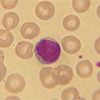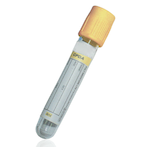
- Home
- Clinical Chemistry Tests
- Alkaline Phosphatase (ALP)
Alkaline Phosphatase (ALP)
Specimen Volume
1mL blood (~250uL serum)Specimen Transport
Not applicable
Sample Preparation
Centrifuge on arrival
Turnaround Time
24 hoursSample Processing In Laboratory
No special requirements
Sample Stability
7 days at 2-8°CGeneral Information
Alkaline phosphatase (ALP) in serum consists of four different structural genotypes: liver‑bone-kidney, intestinal, placental and germ cell variants. ALP is found in hepatocytes, osteoblasts, leukocytes, the kidney, spleen, placenta, prostate and small intestine. Isoenzyme separation is carried out in the laboratory using electrophoresis when requested if ALP elevated and gamma glutamyltransferase (GGT) normal.
A rise in ALP occurs with all forms of cholestasis, particularly obstructive jaundice. It is also elevated in bone disease e.g. Pagets disease, hyperparathyroidism, rickets and osteomalacia, as well as fractures and malignant tumours. High ALP activity is found in children and adolescents because of the increased osteoblast activity related to bone growth - increases in bone ALP of 3-4x the adult range can be seen during this time. Increases above this requires further investigation.
Patient Preparation
None
Notes
EDTA contamination relating to order of blood draw decreases ALP activity.
Reference Range
Adult males and females: 30-130 U/L (Pathology Harmony)
Source of Reference Range
Roche diagnosticsSpecifications
-
EQA Status:
UK NEQAS for Clinical Chemistry
- EQAS Scheme: Yes
Related Tests
Alanine Aminotransferase (ALT) Albumin Alkaline Phosphatase (ALP) Isoenzymes (APISO) Aspartate Aminotransferase (AST) Bilirubin (Total) Gamma Glutamyl Transferase (GGT) Total Protein (serum)Creation Date
Monday, 08 August 2011Modification Date
Wednesday, 02 October 2019General Information
Location of Laboratories
Copyright UHB Pathology 2018
Protection of Personal Information – Clinical Laboratory Services comply with the Trust Data Protection Policy and have procedures in place to allow the Directorate and it’s employees to comply with the Data Protection Act 1998 and associated best practice and guidance.
University Hospitals Birmingham medical laboratories at Queen Elizabeth Hospital, Heartlands Hospital, Good Hope Hospital and Solihull Hospital are UKAS (United Kingdom Accreditation Service) accredited to the ISO 15189:2012 standard. For a list of accredited tests and other information please visit the UKAS website using the following link: https://www.ukas.com/find-an-organisation/
- Molecular Pathology is a UKAS accredited medical laboratory No. 8759
- Biochemistry is a UKAS accredited medical laboratory No. 8910
- Haematology and Transfusion is a UKAS accredited medical laboratory No. 8784
- Clinical Microbiology is a UKAS accredited medical laboratory No. 8760
- Cellular Pathology is a UKAS accredited medical laboratory No. 10141
- Musculoskeletal laboratory is a UKAS accredited medical laboratory No. 9897
- Heartlands, Good Hope and Solihull Hospital pathology laboratories are a UKAS accredited medical laboratory No.8217.
Tests not appearing on the UKAS Schedule of Accreditation currently remain outside of our scope of accreditation. However, these tests have been validated to the same high standard as accredited tests and are performed by the same trained and competent staff.
For further test information, please visit the test database: http://qehbpathology.uk/test-database
For further information contact Louise Fallon, Quality Manager, 0121 371 5962
 Biochemistry
Biochemistry Haematology and Transfusion
Haematology and Transfusion Clinical Microbiology (Including Virology)
Clinical Microbiology (Including Virology) Cellular Pathology
Cellular Pathology General Information
General Information Molecular Pathology
Molecular Pathology